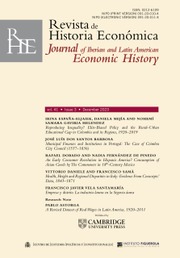Article contents
COMMON LANDS AND ECONOMIC DEVELOPMENT IN SPAIN*
Published online by Cambridge University Press: 26 August 2015
Abstract
The impact of the privatisation of the commons remains a contested topic throughout the social sciences. Focusing on the Spanish case, this article reviews the literature and provides an overall assessment of this historical process based on recent research. Common lands appear to have been reasonably well managed and their dismantling did not foster agricultural productivity. Instead, the privatisation process negatively affected the economic situation of a large proportion of rural households and local councils, as well as deteriorating the stock of social capital. Therefore, the long-standing belief in the existence of a trade-off between equity and efficiency actually turns out to be misleading.
Resumen
El impacto de la privatización de los comunales sigue siendo una cuestión controvertida dentro de las ciencias sociales. Centrándose en el caso español, este artículo revisa la literatura y ofrece una valoración global de este proceso histórico basado en investigaciones recientes. Las tierras comunales estaban razonablemente bien gestionadas y el desmantelamiento del régimen comunal no fomentó la productividad agrícola. El proceso privatizador, en cambio, afectó negativamente a la situación económica de una parte importante de las familias y de los ayuntamientos rurales, además de empeorar el stock de capital social. Por consiguiente, la extendida creencia en la existencia de una relación inversa entre eficiencia y equidad no resulta adecuada.
- Type
- Articles/Artículos
- Information
- Revista de Historia Economica - Journal of Iberian and Latin American Economic History , Volume 34 , Issue 1 , March 2016 , pp. 111 - 133
- Copyright
- Copyright © Instituto Figuerola de Historia y Ciencias Sociales, Universidad Carlos III de Madrid 2015
Footnotes
The author is extremely thankful for the comments received from Bob Allen, Domingo Gallego, Vicente Pinilla, Iñaki Iriarte, José Miguel Lana, Jane Humphries and James Simpson, as well as those from the editor and three anonymous referees. Financial support from the Spanish Ministry of Science and Education (Projects HAR2012-30732 and ECO2012-33286) is also gratefully acknowledged.
Magdalene College, University of Cambridge, Magdalene St., Cambridge CB3 0AG, UK. fjb38@cam.ac.uk.
References
REFERENCES
- 11
- Cited by



